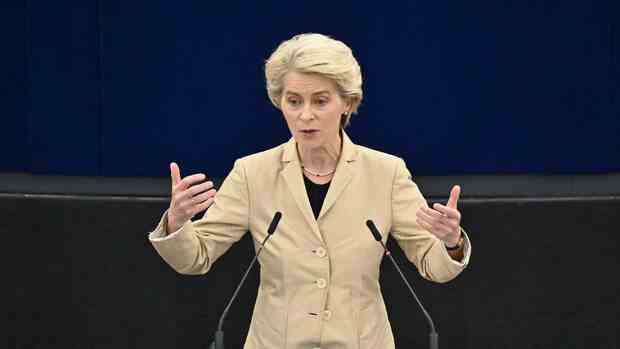The EU Commission President has another year full of challenges ahead of her.
(Photo: IMAGO/Panama Pictures)
Brussels The year started with a success for the EU: Croatia’s entry into the euro zone and the Schengen area underscores the attractiveness of the European project. Commission President Ursula von der Leyen did not miss the opportunity for a positive New Year’s message: she posed in Zagreb with a coffee that her host, Prime Minister Andrej Plenkovic, paid for with a euro note for the first time.
But 2023 will be another difficult year for the EU. The war in Ukraine will once again put the 27 member states to the test – both militarily and financially. Pressure is mounting to supply main battle tanks to enable Ukraine to defeat Russia.
At the same time, the question of reconstruction divided the community: some would like to start repairing the destroyed infrastructure immediately, while others would wait until the end of the war. Just how fragile the united front is became apparent before Christmas when Hungarian Prime Minister Viktor Orban blocked financial aid to Ukraine for weeks for selfish reasons.
The second major challenge of the year is closely linked to the war: energy security. The Europeans are once again faced with the task of filling their gas storage facilities sufficiently by next winter – only this time without Russian pipeline gas. At the same time, they must accelerate the energy transition away from gas towards wind and solar power.
Top jobs of the day
Find the best jobs now and
be notified by email.
In Germany, for example, far too few wind turbines are being built to achieve their own capacity targets by 2030. The EU therefore wants to simplify the approval process for renewable energies. In order to permanently lower energy prices, the electricity and gas markets are also to be decoupled – a highly complicated undertaking with an uncertain outcome.
Advancing the European Green Deal
Additional pressure to act is created by the US subsidy program worth 370 billion dollars for green technologies. In order not to fall behind, the EU Commission is calling for a “sovereignty fund” to be financed with joint EU bonds. Such a fund is rejected by a number of member states, including the federal government, but it is not off the table yet.
Carsten Volkery is a Handelsblatt correspondent in Brussels.
(Photo: Klawe Rzeczy)
Together, these two factors, the Ukraine war and the sudden eco-competition from America, could decisively advance the European Green Deal this year.
>> Read here: This is the federal government’s plan against China’s global influence
The third challenge is the global supply chains. The new Covid wave in China is a reminder that the European economy urgently needs to reduce its dependence on the country. The prospect of renewed container jams in Chinese ports and weeks of waiting for raw materials, preliminary products and spare parts alarmed companies and economists. Because if the supply chains fail again, as they did during the pandemic, Europe is threatened with a deeper recession this year than last expected.
Of course, it is up to companies first and foremost to transform their supply chains – and many seem reluctant to do so. But the state’s attempts to steer diversification have not been particularly successful so far: the “Global Gateway” initiative, for example, with which the EU wants to ensure its own access to raw materials and critical infrastructure, is making slow progress and is not enough for critics focused. As a result, Ursula von der Leyen cannot enjoy Zagreb’s success for long.
More: “Wrong setting of priorities” – EU puts the brakes on reconstruction in Ukraine
